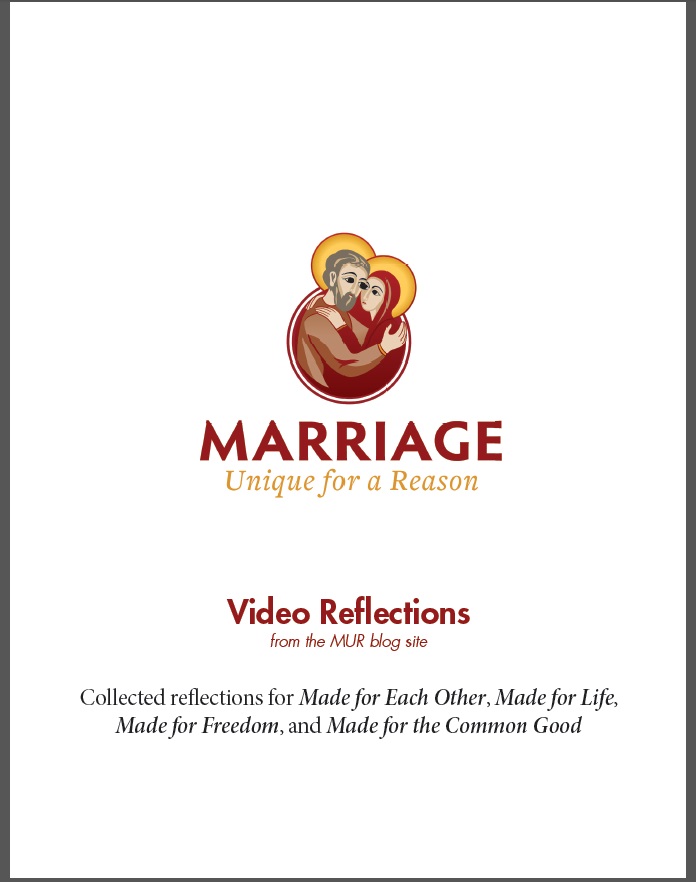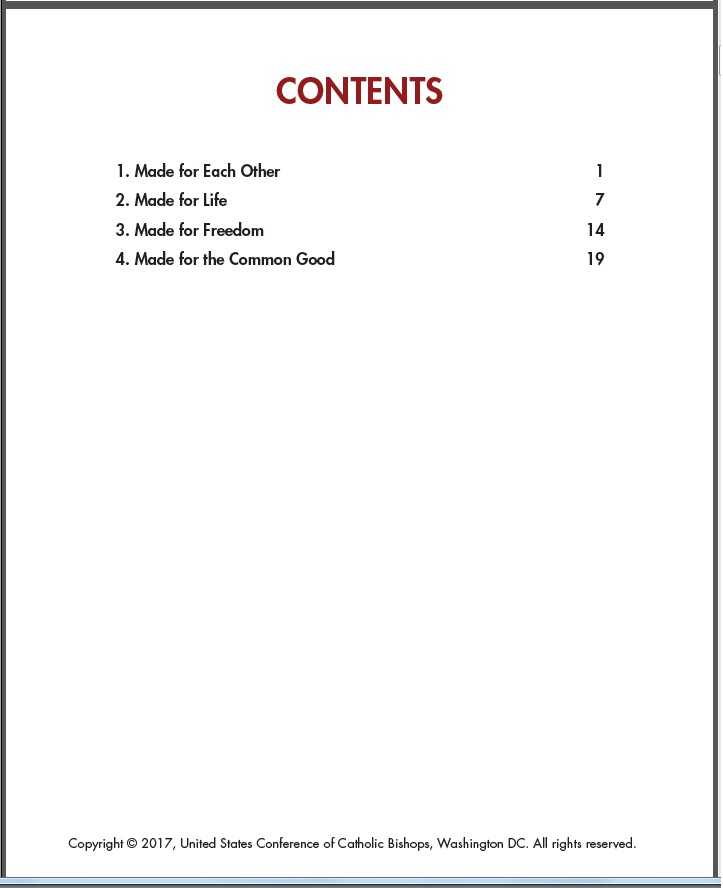Made for Love Ep 17: NFP part one
Natural Family Planning, Part One!
Chastity doesn’t mean abstinence, but rather integrating one’s sexual impulses into love. That’s obviously important in marriage. Anticipating Natural Family Planning awareness week (July 22-28), we talk about NFP with Amy and Duston Stout, Mark and Leslie Wolf, and Rachel and Dax.
Tons of information on NFP is available at the USCCB website.
For example, here’s a page with current medical research about fertility awareness.
If you are interested in finding a class, here’s a directory that includes programs with distance learning.
National NFP Awareness Week is July 22-28, 2018. This year’s theme is “Generations of Love.”
And since Rachel talked about a few books in the podcast, here are links to those:
Life-Giving Love by Kimberly Hahn and John Paul II’s letter Familiaris Consortio
Archive
Made for Love Episode 15: Humanae Vitae Anniversary (Part 1)
Humanae Vitae Part 1
On today’s Made for Love, we look at Humanae Vitae from the perspective of fifty years of change. What is HV all about? Have Pope Paul VI’s predictions come true? This episode features Bishop Ricken (Green Bay), Bishop Rassas (Auxiliary in Chicago), Dr. John Grabowski of CUA, Sister Helena Burns, fsp, Dr. Theresa Notare of the USCCB’s NFP office, and Dr. Lionel and Janet Yaceczko.
Here’s the 1968 Encyclical Humanae Vitae that we are talking about today. That’s the Vatican translation, as Dr. Lionel Yaceczko reads it on the podcast. Here’s another translation, by Dr. Janet Smith (scroll down to find the encyclical).
The USCCB NFP office is keeping an up-to-date list of events and resources for the anniversary.
Here’s Dr. John Grabowski’s faculty page at the Catholic University of America.
Archive
PDF of Video Reflections
 We have compiled the posted blog reflections on our MUR videos into PDF form for your use. Please use and share!
We have compiled the posted blog reflections on our MUR videos into PDF form for your use. Please use and share!
Download HERE today!
Archive
Sexual Difference Matters: Made for Life Series
We finish this series on Made for Life with a clip of Katie and Pete talking about the way that marriage provides the “perfect” setting to raise a child. It takes a man and a woman to bring a new human being into the world. Two men or two women simply cannot do this. So if sexual difference is the basic necessity for conceiving a child, then it makes sense that sexual difference would also be important for raising that child. A mother and a father bring balance and ensure that children always have one person similar to and one persondifferent from them to look up to.
A child’s “first right” is to “be born in a real family,” that is, to be born to his or her own father and mother, bonded in marriage.[i] Protecting this right is a matter of social justice. As the bishops have taught, “To promote and protect marriage as the union of one man and one woman is itself a matter of justice. In fact, it would be a grave injustice if the state ignored the unique and proper place of husbands and wives, the place of mothers and fathers, and especially the rights of children, who deserve from society clear guidance as they grow to sexual maturity.”[ii]
It is sometimes claimed that what really matters for a child is the presence of any two loving, committed adults, regardless of their sex/gender. But there are major problems with this assertion. First, two men or two women are physically incapable of having a child together. Nothing they do can change this fact. Instead, two people of the same sex must either attempt to adopt a child or contract with a “third party” egg or sperm donor who contributes one-half of the child’s genetic material. This means that placing a child in the care of two men or two women deliberately separates that child from his or her father or mother in every single case. Then, those children are further denied the benefit of witnessing a healthy relationship between a father and mother and the experience of the parental love of either a man or a woman. Children deserve better.
Discussion Questions
- Why do you think the Church teaches that a child has a right to be born into a family?
- How does having a mother and father give the child the balance he or she needs?
- What other topics would you like to explore with Marriage Unique for a Reason? Leave a comment and let us know!
[i] Compendium of the Social Doctrine of the Church, no. 244.
[ii] Marriage: Love and Life in the Divine Plan, 22. The needs and rights of the child should be of fundamental concern for every society and community, as is acknowledged in “the principle, recognized also in the United Nations Convention on the Rights of the Child, that the best interests of the child, as the weaker and more vulnerable party, are to be the paramount consideration in every case.” CDF, Considerations Regarding Proposals to Give Legal Recognition to Unions Between Homosexual Persons (2003), no. 7, www.vatican.va/roman_curia/ congregations/cfaith/documents/rc_con_cfaith_doc_20030731_homosexual-unions_en.html.
Archive
Mothers and Fathers are Different: Made for Life Series
This week’s clip begins with Katie and Pete talking about how they play differently with their kids, and moves to Pete talking about society’s obligation to support that which is best for children.
That mothers and fathers are different is a common sense and intuitive statement. It does not mean that “All moms do X” or “All dads do Y” but rather that mothers and fathers, even when they do the exact same thing, do not do it the same way. Men and women just do things differently.
Why is this important and beneficial for children? Sociologically, we don’t know, we only know that it appears to be the case. Philosophically, we can understand it because we know ourselves to be one sex or the other, and therefore seeing both ways of being human every day informs our self-understanding as well as an understanding that there is always another way of being. And theologically, we can see that if sexually-differentiated humanity is really “the image of God,” then our image of God, our idea of who God is and how God loves us, will be incomplete without seeing the love of a man and a woman lived out before us.
And if we know that it’s important for kids to have a mother and a father, and that even if we don’t know why, children consistently do better in that environment, shouldn’t we promote and defend it?
Discussion Questions
- What are practical ways that you can promote and defend marriage today?
- What are examples from your own family of how masculinity and femininity is displayed and honored in a day-to-day way?
Archive
Children Deserve Both a Mother and a Father: Made for Life Series
As discussed last week, single parents can still honor the importance of sexual difference by acknowledging the unique difficulties their families face, but two persons of the same sex who raise a child are unable to do so.
Two men or two women who claim to replace a mother and a father reject the vital role that parental sexual difference plays in the development of a child, especially the child’s sexual identity. Children look to their parents to figure out what it means to be a boy or a girl and how to relate to the opposite sex. When there is not a model in the home of one sex or the other, one of these developmental tasks the child faces necessarily and by definition is made incredibly difficult. How can John understand what it means to be a man when he primarily only sees two women interacting? How can Anna understand her worth as a woman if her two caregivers are both men? As adults, it can be hard to remember what it is to be a child, completely dependent on our parents and constantly absorbing things (largely unconsciously) that shape our understanding of the world. These things aren’t quantifiable or really even “proveable”. We know by faith, in a way, that based on the Catholic understanding of who the human being is, being raised by two men or two women wounds a child. Of course, these wounds are not incurable; the Divine Physician is always ready to heal and transfom the hurts that we sustain as children. But that does not mean that we do not do all that we can as a Church and society to prevent predictable suffering.
Too much of the discussion around marriage redefinition revolved around the supposed “rights” of adults to sexual and social “fulfillment” in a recognized legal partnership rather than the rights of children to know and be raised by their parents. (Or, ironically, one of the Justices argued that “children of same-sex couples” had the right for their “parents” to be recognized by the State, ignoring the fact that, by nature and rights, there are no “children of same-sex couples” except those procured by an unjust system.)
One of the reasons that it is hard to explain and defend the Church’s position on marriage is that, as a society, we have conceptually separated two things that should be together: marriage and having children. We must help our contemporaries to see that these two things belong together, so that we can minimize the damage that will be done to young lives by the choices of adults.
Discussion Questions
- What does it mean that single parents can still “honor” the importance of sexual difference in the lives of their children?
- Consider your experience as a child. What do you think you learned by watching your mother and father interact?
- Given that a child being raised in a same-sex household suffers a wound, how can the Church better support those children?
Archive
Single Parents: Made for Life Series
In this section of Made for Life, a single mother, Elizabeth, talks about her experience of raising her daughter alone; later in the video Elizabeth talks about what hopes she has for her daughter’s future.
Emphasizing the deep need every child has to be raised by a father and a mother does not mean that the Church looks down on single parents. On the contrary, the Church seeks to support single parents who are raising children without the support of a spouse because she recognizes how hard this situation can be. Often a single mother has made a heroic decision in giving her child life and a home despite knowing that the child’s father will not participate. Single parents work hard to provide a stable, loving home for their children in an un-ideal situation. As Elizabeth points out, most single parents did not expect to be “doing this” (raising a child) on their own. Something unexpected happened.
The situation of children being raised by a single parent (due to unforeseen circumstances) is very different from deliberately depriving a child of a mother or a father, which occurs (de facto) when children are raised by two men or two women. While single parents have the freedom to recognize the absence of a father—or a mother—in the lives of their children and talk with their children about this, the absence of either is likely going to be ignored in a same-sex household.[i] Most single parents, like Elizabeth, hope that their child will not have to go through what they did in raising them alone. As she says later in the video, Elizabeth hopes that her daughter marries “a wonderful Christian man who can guide her future family and be a wonderful father.”
We can and must support single parents without sacrificing the teaching that children deserve to know and be raised and loved by both their mother and their father.
Discussion Questions
- How would you explain to someone the difference between a single parent and two men or two women who are raising a child?
- How can the Church and society best support single parents, while holding up the natural family as the ideal?
[i] To read about the experience someone who was raised in a household with two “mothers”, check out Katy Faust’s blog: “Ask the Bigot”.
Archive
Mothers and Fathers Matter: Made for Life Series
In many ways this is one of those truisms that we know through experience: mothers and fathers matter. It is common sense, and it is part of all of our pasts; whether our mother or father were present or absent defines, in many ways, our childhoods. But there are some today who claim that it really doesn’t matter if you have a father or a mother as long as you have people who love you. The redefinition of civil marriage to include persons of the same sex essentially redefines parenthood as well.[i]
Marriage is a pro-child institution. It is not just about the satisfaction of adult desires. Marriage is not something private—it’s a public institution with public roles and responsibilities. The love between husband and wife naturally opens up to include the child, the family, and the greater society. This openness is simply not possible for persons of the same sex, who cannot form a spousal union that is open to the gift of life. They cannot “have a child” together; it’s simply and objectively impossible. Society has, therefore, a legitimate interest in and a just obligation toward protecting and promoting the natural family based on marriage between a man and a woman.
The family is the place where the youngest and most vulnerable members of our society are born and raised. As the “sanctuary of life,”[ii] the family deserves to be valued and aided by society. This is why the Supreme Court’s decision in Obergefell v. Hodges is unjust. In addition to telling a lie about what marriage is, it undermines the social good of natural marriage and the rights of children. Society’s well-being and very existence are bound up with marriage and the family; we must work to overturn this decision, just as we hope one day to overturn the unjust decision in Roe v. Wade.
Discussion Questions
- Does our society treat the family founded on marriage as fundamental?
- What are the reasons that society has, for centuries, privileged the natural family based on marriage between a man and a woman?
[i] This was mentioned in the MUR video Made for Freedom (around 3:44 in the video), with Alana Newman who is a child and advocate for children of third-party reproduction. Alana points out that the redefinition of marriage opens the door for a major increase in third-party reproduction, since two men or two women who “marry” will necessarily need to utilize the reproductive capacities of another person to “have a child.”
[ii] Pope John Paul II, On the Hundredth Anniversary of Rerum Novarum (Centesimus Annus) (Washington, DC: USCCB, 1991), no. 39.
Archive
Children are a Gift: Made for Life Series
Marriage is “made for life” because marriage is the safest and most proper place for God to create other human beings. Why? Because it ensures, as much as possible, that the child will receive the care he or she needs and deserves from both “halves” of his or her origin. The sexual act in marriage is imbued with meaning and consequence, and marriage is the only human relationship that can be considered worthy of bringing new life into the world. Married couples vow themselves into a union that is outward-directed, open to life. You could not really love someone and at the same time say, “But I would never want to have a child with you.” Would that be love? As the bishops of the United States taught in their pastoral letter on marriage, “It is the nature of love to overflow, to be life-giving.”[i]
Pope St. John Paul II taught, “The couple, while giving themselves to one another, give not just themselves but also the reality of children, who are a living reflection of their love, a permanent sign of conjugal unity and a living and inseparable synthesis of their being a father and a mother.”[ii] When a man and woman marry, they are at the same time promising that the only way that they are going to give life to “a third” is with one another.[iii] If either the man or woman experiences infertility, whether permanent or temporary, this is not a cross carried by him or her alone, but rather is a joint cross carried by the couple together. This is part of what the Church means when she teaches that the unitive and procreative meanings of married love are inseparable.
In embracing each other, husband and wife embrace their capacity to conceive a child. This does not mean that a child will be—or should be—conceived from every act of sexual intimacy. It simply means that they are not closed to this natural gift.
As our interviewees say at the end of this clip: each child is a gift of God!
Discussion Questions
- Why is it difficult for people to understand that married love involves openness to life?
- What does it mean to say that “being open to children” at the same time “opens yourself up to your spouse”?
- How are openness to life and sexual difference related?
[i] USCCB, Marriage: Love and Life in the Divine Plan (Washington, DC: USCCB, 2009), 13.
[ii] Familiaris Consortio, no. 14.
[iii] This is one of the ways to understand why the Church holds that in vitro fertilization or surrogacy and the like are immoral; they are ways of creating life that circumvent this promise. Those who resort to these kinds of medical interventions refuse to accept the cross in this situation and often make use of another person’s reproductive capacity (via sperm or egg “donation”).
Archive
Made for Life Blog Series
By their very nature, the institution of matrimony itself and conjugal love are ordained for the procreation and education of children, and find in them their ultimate crown.
–Second Vatican Council, Pastoral Constitution Gaudium et Spes (1965), no. 48[i]
How are marriage and life connected?
Everyone knows “where babies come from” and that marriage, commitment, or really any knowledge of the other person is not strictly necessary. So why is “Life” (or “Children”) one of the four themes for the Marriage: Unique for a Reason initiative? To answer this question, it’s necessary to answer a couple of other questions first:
- What are human beings?
- What do human beings require to flourish?
What are we? There are many helpful definitions of the human being out there that get at our unique constitution: rational animals, ensouled bodies or embodied souls, individuals-in-relation, or, to be a bit more technical about it: “A man, woman, or child of the species Homo sapiens, distinguished from other animals by superior mental development, power of articulate speech, and upright stance.”[ii] We are at the “top of the food chain” even though we are by no means the strongest of animals, and we are the only animals able to consider our own being and destiny. And yet, despite these inherent capacities, we are, at the same time, the most helpless of all animals when we are infants. We take the longest time to become “self-sufficient” and require other creatures to care for us and educate us for years. We cannot survive without our parents or some other adult human being who is willing to step into the place of a parent. And since our senses develop in utero, we know the smell of our mother[iii] and the sound of her voice[iv] and can recognize her when we are born. Our mother’s physical presence can calm us down as infants. There is also evidence that the presence of an involved father during pregnancy reduces the risk of death for the infant for the first year[v] and his physical or mental status can affect his baby’s health.[vi]
In view of these facts, what do human beings need in order to flourish? We need a mother and a father—and not only when we are infants, but all the way through adulthood![vii] If this is how we have been created, it makes sense that in God’s plan, a new human being would come-to-be within a relationship that would (at least attempt to) guarantee that this human being would be cared for by his or her mother and father for all of life. Marriage—the permanent, faithful, fruitful union of one man and one woman—is God’s first and primary way of taking care of each and every one of us from the beginning of our existence. We come-to-be in an act of sexual intercourse between a man and a woman; if that man and woman are married, we end up in the situation best suited to our human development.[viii] “Marriage as fundamentally pro-child, protecting the gift of the child and preserving the vital roles of mothers and fathers.”[ix] So that’s why “Children” is one of our considerations when we talk about the uniqueness of marriage.
The series we are beginning on the MUR blog accompanies short segments of the video Made for Life. In this video, married couples discuss the importance of openness to life to their marriages, and why children do best in homes with married mothers and fathers. During the next six weeks, we will explore these themes a bit more. Much of the posts will contain text found in the Viewer’s Guide of Made for Life. The questions provided can be used for personal reflection or for group discussion.
[i] Second Vatican Council. Gaudium et Spes. http://www.vatican.va/archive/hist_councils/ii_vatican_council/documents/vat-ii_const_19651207_gaudium-et-spes_en.html
[ii] Oxford Living Dictionaries. “Human being”. https://en.oxforddictionaries.com/definition/human_being
[iii] There are a number of places to read about this, including: https://www.womenshealth.gov/itsonlynatural/addressing-myths/incredible-facts-about-babies-breast-milk.html and http://www.parenting.com/article/your-babys-sense-of-smell
[iv] Similarly, there are any number of articles on this, including: http://www.parenting.com/article/what-babies-learn-in-the-womb
[v] “Father Involvement in Preganancy Could Reduce Infant Mortality,” EurekAlert, June 17, 2010, www.eurekalert.org/pub_releases/2010-06/uosf-fii061710.php, as referenced in Paul Raeburn, Do Fathers Matter? (New York: Scientific American, 2014).
[vi] Prakesh S. Shah and Knowledge Synthesis Group, “Parental Factors and Low Birthweight, Preterm, and Small for Gestational Age Births: A Systematic Review,” American Journal of Obstetrics and Gynecology 202, no. 2 (2010): 103-23, as referenced in Paul Raeburn, Do Fathers Matter? (New York: Scientific American, 2014).
[vii] So-called “grey divorce” has dramatically risen in the last decade, and adult children struggle when their parents split up. See one of these articles: https://www.nytimes.com/2016/04/24/fashion/weddings/never-too-old-to-hurt-from-parents-divorce.html?_r=0; http://www.huffingtonpost.com/terry-gaspard-msw-licsw/how-to-move-on-from-your-grey-divorce_b_5242932.html; https://www.hg.org/article.asp?id=32532
[viii] See, for example, W. Bradford Wilcox, “Even for Rich Kids, Marriage Matters,” Family Studies, December 19, 2013;“Why Marriage Matters: Thirty Conclusions from the Social Sciences,” Institute for American Values, 2011. Robin Wilson and W. Bradford Wilcox, “Bringing up Baby: Adoption, Marriage, and the Best Interests of the Child,” William and Mary Bill of Rights Journal. Vol. 14, No. 3, pp. 883-908, February 2006. David Ribar, “Why Marriage Matters for Child Wellbeing,” The Future of Children. Vol. 25, No. 2, Fall 2015. Paula Fomby and Andrew Cherlin, “Family Instability and Child Well-Being,” American Sociological Review. Vol. 72 (2007): 181–204, doi: 10.1177/000312240707200203. Wendy Manning, Pamela Smock, and Debarun Majumdar, “The Relative Stability of Cohabiting and Marital Unions for Children,” Population Research and Policy Review. Vol. 23 (2004): 135–59, doi:10.1023/B:POPU.0000019916.29156.a7. Kathleen Ziol-Guest and Rachel Dunifon, “Complex Living Arrangements and Child Health: Examining Family Structure Linkages with Children’s Health Outcomes,” Family Relations. Vol. 63 (2014): 424–37, doi:10.1111/fare.12071.
[ix] USCCB, Made For Life Viewer’s Guide, p. vii.



